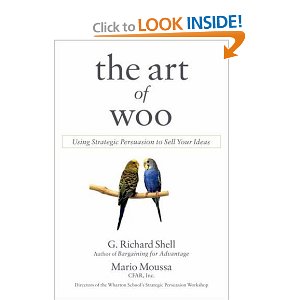 Two of the most important tools in any persuader’s toolbox are stories and questions. When you put them together, they make for a powerful combination.
Two of the most important tools in any persuader’s toolbox are stories and questions. When you put them together, they make for a powerful combination.
Various persuasive questioning processes, including the Socratic method in teaching, Motivational Interviewing in clinical psychology or Huthwaite’s SPIN process in sales, are all designed to get listeners to reach their own conclusion that they must follow the course of action you’re selling. The general principle underlying all these approaches is that rather than trying to motivate people to act for your reasons it is far better to draw out their own motivations. They do this by uncovering gaps between their current situation and an ideal state, and eliciting enough pain and tension that they feel compelled to act to close that gap, ideally with your plan, product, or idea.
Where have we all seen this before?
 Last week I wrote an article about persuasion as a process, in which I emphasized the critical importance of preparation and positioning before you get in front of your intended audience. I’ve chosen The Art of Woo for this week’s book recommendation for the lessons it includes about strategic persuasion.
Last week I wrote an article about persuasion as a process, in which I emphasized the critical importance of preparation and positioning before you get in front of your intended audience. I’ve chosen The Art of Woo for this week’s book recommendation for the lessons it includes about strategic persuasion.
 There was a FedEx commercial where a low-ranking employee suggests opening an online account to save shipping costs. No one responds. A few seconds later, the boss says exactly the same thing, only this time using emphatic gestures. Everyone cheers and adopts the solution. When the young guy points out that he suggested the same idea, the boss says: “But you didn’t go like this”, as he karate-chops the air.
There was a FedEx commercial where a low-ranking employee suggests opening an online account to save shipping costs. No one responds. A few seconds later, the boss says exactly the same thing, only this time using emphatic gestures. Everyone cheers and adopts the solution. When the young guy points out that he suggested the same idea, the boss says: “But you didn’t go like this”, as he karate-chops the air.
That scene may be a bit exaggerated, but the fact is that many speakers unconsciously disarm themselves by imprisoning their hands while they speak. They lose the effectiveness that gestures can contribute to the effectiveness of any presentation or conversation by supplying information, authenticity, and energy.
 We all admire the heroic view of persuasion, where the hero deploys his impeccable reasoning, formidable personality and eloquent words to sway an audience. Think 12 Angry Men, or Win One for the Gipper, or, for the more literary-minded, Mark Anthony’s eulogy for Caesar, where he artfully turned the anger of the mob away from Caesar and against his murderers. It’s easy to be fascinated, because that’s where the drama is.
We all admire the heroic view of persuasion, where the hero deploys his impeccable reasoning, formidable personality and eloquent words to sway an audience. Think 12 Angry Men, or Win One for the Gipper, or, for the more literary-minded, Mark Anthony’s eulogy for Caesar, where he artfully turned the anger of the mob away from Caesar and against his murderers. It’s easy to be fascinated, because that’s where the drama is.
But the most effective persuaders in the long run usually do it without the dramatics. They understand that, in the words of Sun Tzu, the best general is not the one who wins the most battles, but the one who wins without having to fight battles.


